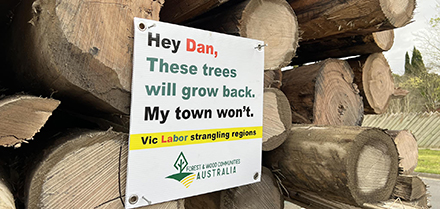The East Gippsland town of Orbost has become the very human face of the plight of the native timber industry in Victoria.
The industry closure scheduled for 2030 has the potential to gut the town.
With a population just shy of 2500, it simply cannot cope with the potential loss of a third of its workforce.
It has been estimated that there are 115 full-time jobs directly dependent on the timber industry in Orbost, and an estimated a further 60 “peripheral” jobs would be affected by the closure.
There are probably more than that.
While this week’s meeting in the town was told it stood to lose more than other timber towns and that the job losses could occur sooner than in other towns.
That because many of Gippsland’s other timber towns are closer to employment opportunities in different industries.
Even for those towns that’s not much comfort.
The ABC reported that Howitt Society secretary Garry Squires conceded it was “difficult to see how 40-odd days out from an election that we’re going to have a major impact on government policy”.
“The community’s starting to realise that the government’s announcement of two years ago is real. What triggered that is the closing of [another] mill … a couple of weeks ago when they completely ran out of logs,” he said.
The State Government in Victoria is deliberately killing an industry and towns in East Gippsland to, it would seem, appease some conservation groups which it is understood helped Labor win the last State election.
True or not, the results are now not in doubt.
Even promises by the Government of $120 million to help “shore up Victoria’s timber supply and supporting the forestry sector’s transition away from native timber” appear to be a repeat of a much earlier promise which was never kept.
Australian Forest Contractors Association general manager Carlie Porteous says that plan simply does not add up.
It doesn’t.
Victoria votes on 26 November. Unfortunately, the election looks like it will be won in Melbourne and the larger regional cities, not in towns like Orbost.
But that doesn’t mean they should give up the fight, as hard as that fight right now seems to be.







